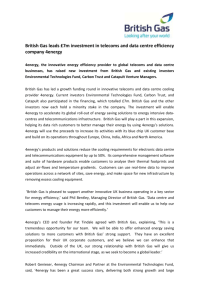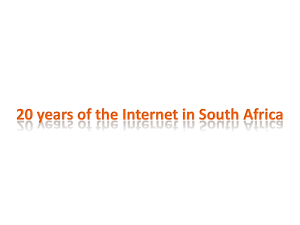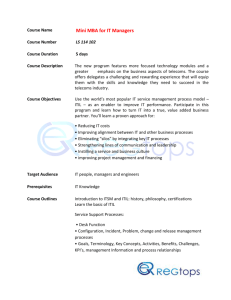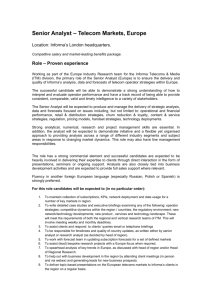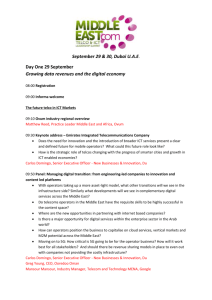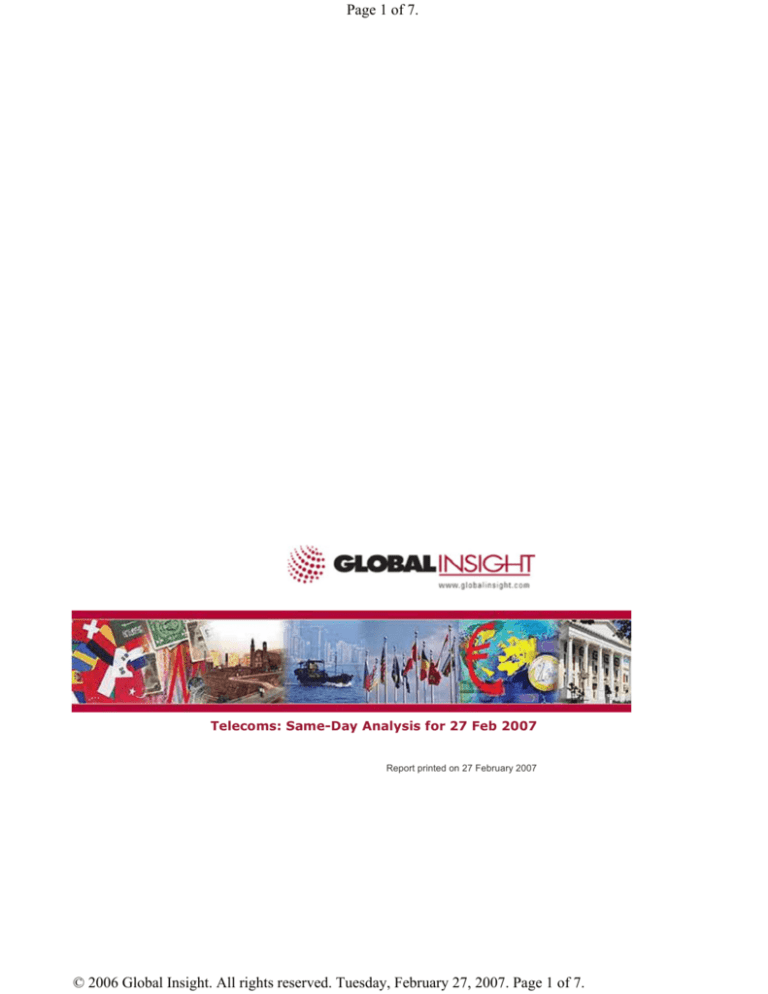
Page 1 of 7.
Telecoms: Same-Day Analysis for 27 Feb 2007
Report printed on 27 February 2007
© 2006 Global Insight. All rights reserved. Tuesday, February 27, 2007. Page 1 of 7.
Page 2 of 7.
Same-Day Analysis
for 27 Feb 2007
Telecoms
Europe: France Telecom Mulls Sale of Orange Netherlands; Five Bidders Emerge
(Tue 27 Feb 2007)
- Reports indicate five parties are interested in buying Orange Netherlands
Telecoms
Australia: Hutchison Australia Expects Improved Earnings on 3G Growth in 2007
- Hutchison Australia today reported an increased net loss for 2006, as the company took a one-off write-down
related to the closure of its 2G CDMA mobile network in August last year, but the company's EBITDA for the year has turned positive,
indicating improved underlying performance.
(Tue 27 Feb 2007)
Telecoms
Russia: VimpelCom Plans US$350-mil. 3G Investment, as Bidding for Licences Ends
(Tue 27 Feb 2007)
- Russia's second-largest operator has given an indication of its planned investment in 3G equipment and network
construction.
Asia-Pacific
Telecoms
India: Ericsson Wins Three-Year GSM Expansion Contract with IDEA Cellular in India
- Ericsson and the Indian operator, Idea Cellular, have today signed a three-year contract for GSM expansion in the
Maharashtra, Gujarat, Rajasthan, Madhya Pradesh and Himachal Pradesh telecoms circles. Under the contract, Ericsson will provide
radio access, microwave transmission and next-generation, mobile softswitch network architecture, until November 2009.
Significance: As the sole supplier, Ericsson will help Idea build a state-of-the-art EDGE-enabled mobile network across the five
circles, which will enable Idea to make a smooth transition to a 3G-ready network once 3G-spectrum allocation is finalised. At the end
of September 2006, Idea had 10.36 million subscribers or 8% of the mobile market in India (see India: 6 February 2007: Idea
Cellular Seeks Mumbai Launch in 2007).
(Tue 27 Feb 2007)
Telecoms
Pakistan: Warid Telecom Launches Voice SMS Service in Pakistan
- Warid Telecom, one of the fastest-growing mobile operators in Pakistan, yesterday launched the "Talky" voice
SMS service based upon the "Voice SMS" technology from Kirusa, a U.S.-based mobile value-added services provider. The voice
SMS service is available nationwide, to all of Warid's prepaid and post-paid subscribers, on all mobile handsets. The subscribers will
pay 0.60 Pakistani rupee (US$0.01) to send a Talky voice SMS message. They will be able to listen to the message free of charge for
the first time, and will pay 0.60 Pakistani rupee for subsequent listens. International messages are priced at a premium. Warid plans
to have a nationwide campaign for launching the Talky voice SMS with large-scale advertising and promotional activities.
Significance: Warid, which launched its mobile services in May 2005, has become the third-largest mobile operator in Pakistan, with
a market share of 14% at end-June 2006. It acquired 4.4 million subscribers during the year ending June 2006. The operator plans to
invest US$1 billion in Pakistan by mid-2007 and has launched a range of aggressive marketing campaigns and innovative features
such as zero line rental for post-paid services, 30-second billing, and low international dialling rates.
(Tue 27 Feb 2007)
Telecoms
Taiwan: Mobile Operators in Taiwan to Bid for WiMAX Licences
- Taiwan's three largest telecoms operators have said that they intend to bid for one of the six wireless broadband
WiMAX licences being put out to tender by the government, Dow Jones reports. Chunghwa Telecom, the island's largest carrier by
revenue, Far EasTone Telecom, the second-placed mobile operator, and Taiwan Mobile all highlighted the complementary potential
of WiMAX to their operations, in light of stagnating revenue growth in a highly-penetrated market.
Significance: The government plans to award three six-year WiMAX licences for each of the northern and southern regions of
Taiwan in June, and at least one 10-year island-wide licence two years later (see Taiwan: 14 February 2007: Government to Issue
Six Regional WiMAX Licences by June in Taiwan). "We want both to learn more about WiMAX with regard to fixed-mobile
convergence and to complement our operations," the Chunghwa Telecom chairman, Ho Chen Tan, said, adding that his company has
not decided yet whether to bid for a licence in the northern or southern region, but will bid "for a regional licence anyway, as the
nationwide licence is two years away."
(Tue 27 Feb 2007)
CIS
Telecoms
Russia: Mobile Telephony Accounts for Two-Thirds of Russia's Telecoms Services' Revenues
- Russia's Economic Development and Trade Ministry has reported that in 2006 mobile Russian communications
companies generated revenues of 827.9 billion roubles (US$31.5 billion), a 23.7% year-on-year (y/y) increase on the previous year,
reports Prime-Tass. Mobile telephony accounted for 67.5% of this total, equating to around 558.8 billion roubles. Local telephony
accounted for 15.0% of the total sum, while international and domestic long-distance telephony accounted for 11.0%, with mail
services accounting for 6.5%. The Ministry also reported that Russia's IT market amounted to 361.5 billion roubles in 2006. The
(Tue 27 Feb 2007)
© 2006 Global Insight. All rights reserved. Tuesday, February 27, 2007. Page 2 of 7.
Page 3 of 7.
number of fixed-line telephones in use in the country rose 2.4% y/y to 41.5 million, while the number of internet users rose 15.1% y/y
to 25.1 million. The number of personal computers being used rose 35% y/y to 23 million.
Significance: The trends indicated by the Ministry's report—of mobile telephony dominating the telecoms sector, and internet usage
increasing significantly—are expected, and fairly typical of the CIS region. It is worth noting, however, that fixed-line uptake continues
to grow, albeit at a low rate. This indicates that the overwhelming trend in Russia is not for users to drop landlines and use mobiles,
but for mobile uptake to grow on top of continued fixed-line use. The fact that fixed-line use is not diminishing also suggests that fixedto-broadband/IP substitution is unlikely in the short term, despite the growth of internet usage. As long as Russians have fixed-lines
they are unlikely to use internet-based telephony.
Telecoms
Ukraine: Ukrtelecom Profit Drops to US$92.8 mil. in 2006
- Ukraine's fixed-line incumbent, Ukrtelecom, generated net profit of 467.8 million hryvnias (US$92.8 million), a
year-on-year (y/y) drop of 9.9%, reports Ukrainian News. In the fourth quarter alone net profit rose 56.6% y/y to 285.5 million hryvnias.
The operator's net revenue in 2006 rose 1.4% y/y to 6.701 billion hryvnias. Ukrtelecom's subscriber base rose 4.8% y/y to 11.52
million subscribers, according to Prime-Tass, citing the country's State Statistics Committee. This equates to around 70% of the
national fixed-line market, down from 78.5% at the end of the first half of 2006. Of the total, 9.56 million were residential subscribers,
equating to 82.95%. The subscriber number in urban areas rose 5% y/y to 9.9 million, while in rural areas subscriber numbers rose
3.6% y/y to 1.6 million.
Significance: Beset by government wrangling over its privatisation and falling revenues due to fixed-to-mobile substitution,
Ukrtelecom's progress through 2006 was far from serene. The sale of the operator, 92.86% owned by the government, was agreed to
in January as part of an ongoing political dispute between President Viktor Yushchenko and Prime Minister Viktor Yanukovych
(see Ukraine: 29 January 2007: Ukrtelecom Privatisation Finally Approved). Ukraine's State Property Fund had initially indicated
that a 10% stake would initially be sold, in order to gauge the value of the entire stake, but this may now be reduced to 5%. The
operator has also been granted Ukraine's first 3G licence, in an attempt to help it compete with the mobile operators which dominate
Ukraine's telecoms sector, and the launch of 3G services is due in 2007. However, this has previously been delayed, and the
operator's lack of experience in the mobile sector raises questions over its ability to capitalise in the sector. The operator's
disappointing financial results and drop in fixed-line market share are trends which need to be reversed in 2007, particularly if
potential investors are to be attracted.
(Tue 27 Feb 2007)
Europe
Telecoms
Europe: Telenor Denies Takeover Talks with Finland's Elisa
- Norway's leading telecoms group, Telenor, has denied press reports that it is in takeover talks with Finland's Elisa.
Dow Jones reports that the denials follow a report in the Norwegian trade publication,Teknisk Ukeblad, that recent talks between the
two companies may lead to a takeover deal.
Significance: A takeover would not be completely out of place for Telenor, considering that it already has a partnership agreement
with Elisa. Finland remains the key Scandinavian market where Telenor does not operate a full service.
(Tue 27 Feb 2007)
Telecoms
Germany: KPN Confirms E-Plus' Outsourcing Deal With Alcatel-Lucent
(Tue 27 Feb 2007) - The Dutch telecoms group, KPN, has confirmed that it signed an outsourcing deal for construction, operation and
maintenance of the network of its German unit, E-Plus, with the global equipment maker, Alcatel-Lucent. The network integrator will
be managing several network business divisions of E-Plus. Under the terms of the agreement, E-Plus will transfer the operational
business divisions responsible for the operation, maintenance and deployment of its cellular network to Alcatel-Lucent on 1 March. As
part of the deal, E-Plus will transfer around 750 employees to Alcatel-Lucent, which beat its rivals, Ericsson and Nokia, to win the
contract. E-Plus will maintain responsibility for strategic network planning and network development. The financial details of the deal
were not disclosed.
Significance: This is the first outsourcing deal by the mobile network operator in Germany. It will enable E-Plus to achieve greater
cost and operational synergies of its future network construction and maintenance requirements. By outsourcing some of its divisions,
E-Plus will be able to focus on its core business, reduce operational expenses and increase network quality. The move is part of a
new strategic restructuring at E-Plus, which will involve the recruitment of more than 350 new employees for its sales and retail
activities, while reducing 300 jobs at the managerial level in an effort to strengthen its distribution network and sales force in efforts to
boost its growth and efficiency (see Germany: 22 January 2007: KPN to Restructure E-Plus and Germany: 8 December 2006: EPlus Mulls Network Outsourcing). E-Plus is Germany’s third-largest mobile provider, behind Deutsche Telekom's T-Mobile and
Vodafone Germany.
Telecoms
Hungary: Active Mobile Subscribers in Hungary Increase in January
- The number of mobile subscriptions in Hungary reached 9.958 million at the end of January, which was 8,000 less
than in the previous month, according to the national telecoms regulator, the NHH. However, the number of active mobile users rose
by 27,000 to 9.385 million in the same period. The NHH confirmed that the country's leading mobile operator, T-Mobile Hungary,
controlled 44.89% of the active mobile customers at the end of January, with Pannon on 33.67% and Vodafone on 21.44%.
Significance: The NHH defines active users as mobile customers making and receiving calls in the last three months. Mobile number
portability (MNP), which was introduced in Hungary in May 2004, enabled 4,625 customers to switch operators, bringing the total
number of MNP subscribers to 147,317. Last year, the regulator introduced a gradual reduction in mobile termination fees by 40-50%
by January 2009, which has put more pressure on mobile operators. Its three-year strategy to lower mobile fees is expected to drive
retail prices down, boosting competiton (see Hungary; 2 January 2007: Regulator in Hungary Evaluates Its Telecoms Market
Strategy and Hungary: 3 July 2006: Hungarian Regulator Proposes New Mobile Termination Fees).
(Tue 27 Feb 2007)
Telecoms
Latvia: Bite Latvija Records US$8.8 mil. Revenues in 2006
- Lativa's third-largest mobile operator, Bite Latvija, has reported that in 2006 it generated revenues of 23.12 million
© 2006 Global Insight. All rights reserved. Tuesday, February 27, 2007. Page 3 of 7.
(Tue 27 Feb 2007)
Page 4 of 7.
litas (US$8.8 million), reportsBaltic Business Weekly. This represents a 737.8% year-on-year (y/y) increase for the operator which
only began operations in September 2005, and which generated revenue of just 2.76 million litas by the end of 2005. Bite's
investments totalled almost 48 million litas in 2006, contributing to EBITDA (earnings before interest, taxes, depreciation, and
amortisation) which was negative by 11.159 million euro (US$14.7 million). Bite has also reported that in 2006 its subscriber base
rose to around 197,700, higher than had been previously estimated byBaltic Business Weekly.
Significance: Latvia's mobile market is currently dominated by Tele2 and Latvian Mobile Telephone, but with penetration
approaching 100% in the country there is likely to be increased focus on the value-added sector rather than organic subscriber
uptake. Bite has plans in place to challenge in the 3G sector, with new owners Mid Europa Partners promising investments in this
area. Outgoing CEO Maarten van Engeland has commented that the operator's negative EBITDA was unexpected given the group's
investment plan for 2006, and further investment will be undertaken, in the areas of network development and customer service, as
Bite attempts to capture 13% of the national market by the end of 2007.
Telecoms
Lithuania: Bite Lietuva Launches US$395-mil. Tranche Bond Plans
(Tue 27 Feb 2007) - Lithuania's second-largest mobile operator, Bite Lietuva, has announced that it will attempt to raise 300 million
euro (US$395.3 million) through two tranches. One will be a 185-million-euro secured tranche, due in 2014, while the other will be a
115-million-euro senior subordinated tranche, due in 2017. Neither bond will be callable for two years. A roadshow for the issue and
investor meetings will take place later this week. Deutsche Bank is the sole bookrunner and Calyon is co-lead manager.
Significance: The tranche-bond issue is aimed at refinancing debt incurred by Mid Europa Partners' US$583-million acquisition of the
Bite group in January (see Lithuania: 22 January 2007: TDC Agrees to Divest Bite for US$583 mil.). Mid Europa has indicated
that it is prepared to invest in Bite, focusing in particular on 3G and HSDPA deployment. Earlier this week Bite Lietuva announced that
annual revenues in 2006 rose 13.4% to 593.4 million litas (US$226.9 million), while investments came to 105.5 million litas
(see Lithuania: 26 February 2007: Bite Lietuva Records Annual Revenue of US$227 mil. in 2006). As yet, no parties have
indicated a definite interest in Bite's tranche bond issue.
Telecoms
Poland: Polkomtel Posts 5.1% Y/Y Increase in End-2006 Net Profit
(Tue 27 Feb 2007) - Poland's number-three mobile operator, Polkomtel, saw a full-year net profit increased by 5.1% year-on-year (y/y)
to 1.12 billion zloty (US$377.5 million) in 2006, according to the company's CEO, Jaroslaw Bauc, who was interviewed by the Polish
daily, Gazeta Prawna. The cellco posted a 13% y/y rise in revenue to 7.34 billion zloty. Polkomtel invested 1.1 billion zloty in 2006,
which was slightly lower on its 2005 level of capital expenditure. The company expects the performance to continue this year, with a
5% y/y increase forecast for its end-2007 EBITDA (earnings before interest, tax, depreciation and amortisation). At end-2006, the
cellco had 12 million customers, with gains largely in the pre-paid segment.
Significance: Polkomtel is counting on growth in the pre-paid segment in 2007, while the reductions in the mobile interconnecting
rates, announced in November last year by the telecoms market regulator, the UKE, are likely to slow growth. Further cuts in the
mobile interconnection rates are also expected this year. In the long term, the company expects to benefit from the growth of mobile
data revenues. Polkomtel is more than 60%-controlled by state-owned enterprises, including the copper conglomerate, KGHM
(19.61%), the national oil company, PKN Orlen (19.61%), the electricity grid operator, PSE (16.05%), and the coal producer,
W glokoks (5.5%). The remaining shares are owned by foreign investors, including the United Kingdom's Vodafone (19.61%) and
Denmark's TDC (19.61%). Vodafone has been keen to boost its stake in Polkomtel, while TDC has considered withdrawing from its
Polish investment (see Poland: 20 March 2006: Vodafone Determined in Polkomtel Lawsuit).
Telecoms
Poland: PTC Diversifies Into Computer Sales
(Tue 27 Feb 2007) - Poland's number-two mobile operator, PTC, has launched a new product portfolio, bundling broadband internet
access services with portable computer sales. Currently, the company offers Fujitsu-Siemens laptops for 1.0 zloty (US$0.34) when a
customer opts for a three-year contract to its high-speed internet service, which costs 180 zloty per month. As the Fujitsu-Siemens
laptops are not equipped with in-built data cards, the operator provides a network adapter produced by the Chinese vendor, Huawei.
Significance: The move signals that PTC has diversified into other portable end-user consumer electronic devices. The company is
planning to widen its range of laptops to include products equipped with built-in network cards. PTC estimates that the FujitsuSiemens laptop it offers costs on average 2,000 zloty, while its new offering will generate more than 5,000 zloty after one three-year
period. The service requires a high level of subsidies. Polkomtel estimates that some 0.5 million laptops were sold in Poland in 2006.
Telecoms
Poland: Tele2 Wins 107,500 WRL Customers from TP by Mid-February
- Poland's alternative telco, Tele2, poached 107,500 customers from the incumbent, Telekomunikacja Polska (TP),
by mid-February, following its wholesale line rental (WLR) agreement, which has been effective from 8 January.
Significance: TP has signed WLR agreements with six alternative telcos, which have been a breakthrough in the further liberalisation
of the country's telecoms market. The telecoms market regulator, the UKE, has confirmed that seven more telcos have recently lined
up for further WLR agreements with TP (see Poland: 4 January 2007: Six Rivals to Compete for TP's ADSL Customers). Tele2, a
pan-European operation, aimed for 100,000 WLR clients in Poland by the end of January. It targets a 10% market share in 2-3 years,
while estimating that WLR business will represent 80% of its customer base (see Poland: 18 January 2007: Tele2 Poland Targeting
100,000 WLR Customers in January 2007, Poland: 8 December 2007: Tele2 Receives 90,000 WLR Orders and Poland: 18
October 2007: TP to Enable WLR for Tele2 in December).
(Tue 27 Feb 2007)
Telecoms
Romania: UPC Romania Readies to Bid for WiMAX Licence
(Tue 27 Feb 2007) - Romania's leading cable operator, UPC Romania, part of the U.S.-based broadband cable group, Liberty Global,
is planning to bid for a point-to-multipoint broadband wireless licence. The company is pledging to invest some 40 million euro (US$53
million) in the modernisation of its infrastructure and triple-play services. UPC Romania has invested more than US$500 million since
it entered the Romanian market in 1992.
Significance: The Romanian telecoms market regulator, the ANRC, is planning to issue the country's first WiMAX licence this year.
WiMAX is expected to rival and complement fixed broadband technologies, including ADSL and broadband cable, enabling high-
© 2006 Global Insight. All rights reserved. Tuesday, February 27, 2007. Page 4 of 7.
Page 5 of 7.
speed wireless access for portable computers and devices. Romania's fixed-line incumbent, RomTelecom, majority-owned by
Greece's OTE, is also planning to participate in the WiMAX tender. UPC Romania has recently consolidated its position on the
Romanian cable TV market, following its merger with its larger rival, Astral Telecom, as well as 13 local cablecos (see Romania: 2
August 2006: UPC Romania to Merge with Astral Telecom and 13 Smaller Cablecos). So far, several mobile, cable and
alternative telecoms operators have been testing WiMAX in Romania, which is likely to be used in residential areas for DSL
alternative/gap-filling broadband access (see Romania: 5 May 2006: Romania Targets 19% Broadband Penetration by 2009).
Telecoms
Romania: Vodafone Romania Expands HSDPA Network
- The Romanian unit of the U.K. mobile group, Vodafone, has expanded its HSDPA network to six new cities, ClujNapoca, Brasov, Constanta, Craiova, Timisoara and Iasi. The operator offers wireless connectivity services for laptops, branded
Vodafone Mobile Connect, which costs US$35 per month and includes Mobile Internet & Office with 1 GB traffic under a two-year
contract. Its Vodafone Smart Modem 3G broadband offering, for use with PCs or laptops, also costs US$35 per month with 1 GB of
traffic allowance.
Significance: Vodafone Romania upgraded its W-CDMA network to HSDPA technology in October 2006, initially covering Bucharest,
the capital. HSDPA services enable data transfer speeds of up to 1.4 Mbps, up to four times faster than its existing 3G network. The
company is planning to increase download speeds to 3.6 Mbps in the course of this year. Vodafone's 3G W-CDMA network is
currently available in 23 Romanian cities: Alba Iulia, Arad, Bacau, Baia Mare, Bistrita, Brasov, Braila, Bucuresti, Buzau, Constanta,
Cluj-Napoca, Craiova, Deva, Galati, Iasi, Oradea, Ploiesti, Pitesti, Satu Mare, Sibiu, Turda, Targu Muresa and Timisoara. Vodafone
Romania attracted 298,000 3G users at end-2006, representing 3.9% of its total customer base, of which 68,000 subscribed in the
last quarter of 2006, accounting for 12.1% of its net new additions (see Romania: 1 February 2007: Vodafone Romania Adds 1.6
mil. Customers in 2006 and Romania: 2 November 2006: Vodafone Romania Expands 3G Coverage to 23 Cities).
(Tue 27 Feb 2007)
Telecoms
Turkey: Turkcell Sign US$3 bil. Unsecured Syndicated Loan
(Tue 27 Feb 2007) - The Turkish mobile operator, Turkcell, has announced that it has completed a deal for a US$3 billion unsecured
syndicated loan. Akbank TAS, Citibank NA, Garanti Bankasi, HSBC plc, JP Morgan and Standard Bank acted as Initial Mandated
Lead Arrangers and underwriters.
Significance: This is the largest unsecured loan facility ever obtained by a single company in Turkey and it has been completed in
association with 34 banks in 16 countries. Turkcell will use the loan for international investments and for the company’s general
funding requirements. The operator has also successfully submitted a bid for the third Saudi mobile licence (see Saudi Arabia: 26
February 2007: Bids Come In for Saudi Cellular Licence), which is expected to cost in the region of US$3-4 billion, although the
operator has confirmed that it has formed a consortium with the Saudi billionaire, Prince Walid bin Talal—the eighth-richest man in the
world—with a view to obtaining the licence.
Latin America and Caribbean
Telecoms
Colombia: Etell Accepts ETB's Offer for Acquisition
(Tue 27 Feb 2007) - Following the 19 February announcement of an offer for acquisition of 95.8% of Empresa de Telecomunicaciones
del Llano (Etell) from other Colombian telecoms provider Empresa de Telecomunicaciones de Bogotá (ETB), the former has accepted
the offer for a total of 22 billion Colombian pesos (US$9.93 million). Etell offers fixed telephony and internet services in the
department of Meta and at the end of 2006 counted 33,185 lines in service and 40,250 installed ones. After conclusion of the
acquisition process and transfer of 78,446 shares of Etell, ETB will gain full control of Etell, which according to the announcement
presented estimate revenues of 15 billion Colombian pesos in 2006 and net profits of 1.4 billion Colombian pesos for the same period.
Significance: Colombia's telecoms market is one of the largest and most promising markets in Latin America for telecommunications
providers because of its size (43.6 million) and rapid growth rate, although it is still far from saturation. ETB is active in the capital
region of Bogotá and was in the headlines recently when it sold Colombia's third-in-size mobile operator Colombia Móvil to Millicom
International Cellular SA in August 2006 (see Colombia: 1 September 2006: Millicom Wins Colombia Móvil Acquisition).
Telecoms
Mexico: Maxcom Deploys Juniper Routers to Support Triple-Play Services
(Tue 27 Feb 2007) - California-based network solutions provider Juniper Networks has announced that Mexican telecoms carrier
Maxcom Telecomunicaciones has upgraded its IP/MPLS backbone network with the M-series Juniper Networks routers to support
VoIP and other multi-play services better. This is the second phase of an upgrade of Maxcom's network with Juniper Networks
solutions. It was previously done with the E-series routers to enable the introduction of IP TV to launch its own triple-play services.
Significance: Maxcom is the first telephony provider in Mexico to offer triple-play services, fully supported by its own network
(see Mexico: 19 October 2006: Maxcom to Launch Triple-Play Services in March 2007). This was only allowed recently following
regulatory changes related to convergence products, which allow cable TV and fixed-line carriers to expand services and increase
competition in the local market.
Telecoms
Paraguay: Mobile Operators Revenue for 2006 in Paraguay Up 37.1%
- As reported in Paraguayan newspaperABC Color, local mobile telephony operators posted revenues of US$345
million in 2006, which represents an increase of 37.1% compared with 2005. According to the same report, revenue growth rate in
December 2006 was increased by 15.5 % compared with the same month in 2005.
Significance: Paraguay is among the Latin American markets with the lowest fixed penetration rate, balanced by a 52% mobile
penetration and a total of 2.9 million subscribers at the end of 2006. Although the country's population is considerably lower compared
with neighbouring Argentina and Brazil, there are four mobile operators in the local market including Telecel, a unit of Millicom
International Cellular. Telecel is the market leader in Paraguay and together with the rest of Millicom's operations in Central and South
America has contributed by 71% to Millicom's total revenue figure of US$ 1,576.1 million for 2006.
(Tue 27 Feb 2007)
© 2006 Global Insight. All rights reserved. Tuesday, February 27, 2007. Page 5 of 7.
Page 6 of 7.
Middle East and North Africa
Telecoms
United Arab Emirates: du Announces Plans for Outsourcing Services for Other International Telecom
Operators
(Tue 27 Feb 2007) - The recently launched U.A.E. mobile operator, du, has stated that it will offer an outsourcing service for other
telecom operators globally. The new service will be in partnership with the European telecoms networking organisation, Interoute.
Significance: du's latest offering, the Arena Voice Exchange on the Virtual Voice Network (VVN), will provide a complete carrier
grade switch and network solution for telecoms service providers looking to outsource their switching networks around the world. It
offers a full suite of partitioning, telehousing, bandwidth and managed services. The CEO of du, Osman Sultan, said, “we aim to be
the partner of choice as the telecommunications hub in the region, and a gateway for other carriers from Europe or Asia-Pacific.”
NAFTA
Telecoms
Mexico: Maxcom Deploys Juniper Routers to Support Triple-Play Services
(Tue 27 Feb 2007) - California-based network solutions provider Juniper Networks has announced that Mexican telecoms carrier
Maxcom Telecomunicaciones has upgraded its IP/MPLS backbone network with the M-series Juniper Networks routers to support
VoIP and other multi-play services better. This is the second phase of an upgrade of Maxcom's network with Juniper Networks
solutions. It was previously done with the E-series routers to enable the introduction of IP TV to launch its own triple-play services.
Significance: Maxcom is the first telephony provider in Mexico to offer triple-play services, fully supported by its own network
(see Mexico: 19 October 2006: Maxcom to Launch Triple-Play Services in March 2007). This was only allowed recently following
regulatory changes related to convergence products, which allow cable TV and fixed-line carriers to expand services and increase
competition in the local market.
Sub-Saharan Africa
Telecoms
Sub-Saharan Africa: Gateway to Launch Pan-African Pay-TV Service
- Gateway Communications, the voice and data carrier dedicated to sub-Saharan Africa, has announced that it will
launch a pan-African pay-TV service. Called GTV, the satellite-based direct-to-home (DTH) service will be available from mid-2007,
with a phased roll-out across sub-Saharan Africa. The DTH service will compete directly with DSTV, the pay-TV service launched by
MultiChoice in 1986. Gateway says that GTV will provide a unique bouquet of high quality international and local entertainment
content with a subscription price aimed at penetrating the chronically underserved African television market. It will target customers
who have been unable to afford subscription-based services and have been limited to a small number of national free-to-air television
stations. "The African market has been artificially constrained by monopoly pricing and non-relevant content," said Julian McIntyre,
president of Gateway Communications. "GTV will be a pay-TV platform for Africa, not simply rebroadcasts of European or
South African content."
Significance: DSTV had some 1.033 million digital subscribers in South Africa by March 2006, and just 333,800 subscribers in 50
other countries across Africa and Indian Ocean islands (source: MultiChoice). Africa represents the least-penetrated pay-TV region in
the world, says Gateway, with less than 1% of television-owning households in sub-Saharan Africa currently subscribing to pay-TV
services, compared with 15% in Eastern Europe, 36% in Western Europe, and 93% in North America. However, with more than 46
million TV sets and growing at well over 10% per annum, Africa represents a large and rapidly growing market for subscription
television.
(Tue 27 Feb 2007)
World and Regions
Telecoms
Europe: Telenor Denies Takeover Talks with Finland's Elisa
- Norway's leading telecoms group, Telenor, has denied press reports that it is in takeover talks with Finland's Elisa.
Dow Jones reports that the denials follow a report in the Norwegian trade publication,Teknisk Ukeblad, that recent talks between the
two companies may lead to a takeover deal.
Significance: A takeover would not be completely out of place for Telenor, considering that it already has a partnership agreement
with Elisa. Finland remains the key Scandinavian market where Telenor does not operate a full service.
(Tue 27 Feb 2007)
Telecoms
Sub-Saharan Africa: Gateway to Launch Pan-African Pay-TV Service
- Gateway Communications, the voice and data carrier dedicated to sub-Saharan Africa, has announced that it will
launch a pan-African pay-TV service. Called GTV, the satellite-based direct-to-home (DTH) service will be available from mid-2007,
with a phased roll-out across sub-Saharan Africa. The DTH service will compete directly with DSTV, the pay-TV service launched by
MultiChoice in 1986. Gateway says that GTV will provide a unique bouquet of high quality international and local entertainment
content with a subscription price aimed at penetrating the chronically underserved African television market. It will target customers
who have been unable to afford subscription-based services and have been limited to a small number of national free-to-air television
stations. "The African market has been artificially constrained by monopoly pricing and non-relevant content," said Julian McIntyre,
president of Gateway Communications. "GTV will be a pay-TV platform for Africa, not simply rebroadcasts of European or
South African content."
Significance: DSTV had some 1.033 million digital subscribers in South Africa by March 2006, and just 333,800 subscribers in 50
other countries across Africa and Indian Ocean islands (source: MultiChoice). Africa represents the least-penetrated pay-TV region in
the world, says Gateway, with less than 1% of television-owning households in sub-Saharan Africa currently subscribing to pay-TV
services, compared with 15% in Eastern Europe, 36% in Western Europe, and 93% in North America. However, with more than 46
million TV sets and growing at well over 10% per annum, Africa represents a large and rapidly growing market for subscription
(Tue 27 Feb 2007)
© 2006 Global Insight. All rights reserved. Tuesday, February 27, 2007. Page 6 of 7.
Page 7 of 7.
television.
Copyright ©2007 Global Insight Inc.
Terms of Use • Privacy Policy
© 2006 Global Insight. All rights reserved. Tuesday, February 27, 2007. Page 7 of 7.

